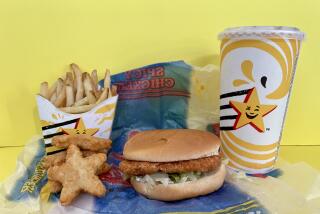Who Eats Fast Food? Americans More Than Ever
- Share via
America is enjoying one Whopper of a Big Mac Attack, according to a national survey by the Washington Post.
The poll shows that Americans don’t expect fancy food under the Golden Arches or beneath the Taco Bell. Nor do we expect particularly healthful food. Inexpensive, fast and filling; that’s the recipe for the food that many Americans love to hate--and eat anyway.
Who eats fast food?
--Nearly half--48%--of those interviewed said they eat fast food at least once a week. About 4% say they eat it once a day, which translates into roughly 8 million fast-food aficionados.
--Younger people are far more likely than older people to eat fast food. Nearly six out of 10 respondents between 18 and 34 years of age say they eat fast food at least once a week, compared to just one out of four persons 65 or older.
--Middle-income Americans are more likely to eat fast food than are the very poor or the relatively affluent. Only about a third of those with household incomes less than $15,000 a year say they eat fast food at least once a week, compared to six out of 10 in families with incomes between $25,000 and $50,000.
--There’s a fast-food gender gap; men eat fast food somewhat more often than women. And men are far less likely to doubt the nutritional benefits of fast food than are women.
--The survey even found that Republicans are more likely than Democrats to eat fast food; 51% of all Republicans but 43% of all Democrats eat at fast-food restaurants at least once a week.
To measure attitudes toward fast food, the Post interviewed 1,002 randomly selected adults nationwide June 8-12. Margin of sampling error for the overall results is plus or minus three percentage points.
Why do Americans eat at fast-food restaurants?
Because it’s fast, says a 44% plurality of those interviewed. Six percent say they eat at fast-food restaurants mainly because they like the food, the same percentage who eat there primarily because it is a “good place to eat if you have children.”
Nutrition? Thank you, but not while I’m eating fast food. Fewer than 1% say the biggest reason they eat fast food is because it is nutritious.
While for many Americans a trip to the neighborhood fast-food restaurant has become the routine, for others it is a special occasion. The second most frequently cited reason for eating at fast-food restaurants is that they are “something different, a break from the routine.”
That is particularly true of less-affluent and older respondents. Nearly four out of 10 persons with household incomes less than $15,000 a year say the major reason they eat at a fast-food restaurant is because it provides a welcome break from the routine. In contrast, only about one out of 10 persons with household incomes greater than $40,000 a year goes to fast-food restaurants primarily for this reason.
Whether they eat fast food often or infrequently, many Americans appear to feel a bit guilty about eating so much of it. More than half--54%--of those interviewed acknowledge that fast food is “not too good” or “not good at all” for you.
Remarkably, this view varies little between frequent and occasional fast-food eaters. Among those who eat at fast-food restaurants at least several times a week, 51% say it isn’t too good for you. Among those who go just once a month or less often, 53% say it isn’t too good for you. (Among those who never eat it, eight out of 10 say fast food is not healthful.)
Many Americans say they have cut down on certain fast-food delicacies because of concerns about health. In fact, nearly half--47%, including those who most frequently eat at fast-food restaurants--say they have stopped ordering or cut back on certain items because of concerns about nutrition.
That view is most frequently expressed by middle-aged respondents, wealthier people and women: 50% of all women compared to 44% of all men report they have changed their fast-food eating habits because of concerns about nutrition.
About four in 10 respondents say they try to eat something healthier after a meal at a fast-food restaurant--a view expressed by far more women than men. In fact, about half of all women questioned say they usually try to eat something “lower in fat, salt, cholesterol or calories” for their “next meal,” compared to fewer than a third of all men.
Older people too are more likely to say they try to eat healthier after dining in a fast-food restaurant. The most frequent fast-food eaters are, however, the least likely to do so. Only a third of those who eat fast food at least several times a week say they try to make sure their next meal is healthier. In contrast, about half of those who only eat fast food once a month or less say they attempt to eat better the next meal.
But the survey did find that most people agree that fast-food restaurants are serving more healthful food now than they did just a few years ago. Nearly 60% of respondents say fast-food restaurants “have started serving more healthful and nutritious food” in the past few years, a view more frequently expressed by women than by men.
Nearly three out of four respondents also say fast-food restaurants should be required to provide nutrition information on the wrappers or containers of the food they sell. But the survey results suggest that most Americans would look the other way even if such information were widely available.
Currently, McDonald’s will provide nutritional information to customers who request it. Of those who have eaten at McDonald’s, 94% acknowledge they have never asked for the brochure--including more than nine out of 10 people who support nutrition labels on fast food.
More to Read
Eat your way across L.A.
Get our weekly Tasting Notes newsletter for reviews, news and more.
You may occasionally receive promotional content from the Los Angeles Times.










